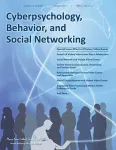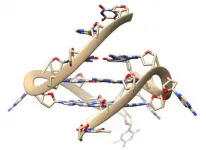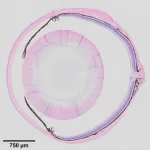Approximately half of AD dementia cases are mild, one-fifth are severe
Little data on the severity of disease among people living with AD currently available
2021-01-13
(Press-News.org) (Boston)--What percent of patients with Alzheimer's Disease (AD) currently have severe dementia? Do more people have mild disease? Or are the majority suffering with moderate dementia? A new study using data from the Framingham Heart Study (FHS) sheds light on these trends.
Boston University School of Medicine researchers have found that slightly more than half (50.4 percent) of cases are mild, just under one-third (30.3 percent) of cases are moderate and 19.3 percent are severe cases. Among all participants with mild cognitive impairment (MCI) and AD, the pooled percentage was 45.2 percent for the combined group of mild AD dementia and MCI that later progressed to AD.
"Early intervention in MCI or the mild stage of AD dementia has been the primary focus for AD research and drug development in recent years. We found that approximately 45 percent of all those who are cognitively impaired or diagnosed with AD-dementia had early AD. Our results serve to inform the design of future research studies such as clinical and observational studies and provide optimal resource allocation for policy-making," explained corresponding author Rhoda Au, PhD, professor of anatomy and neurobiology at Boston University School of Medicine.
To characterize the distribution of severity of AD dementia and MCI among prevalent cases in the population, FHS participants (aged 50-94) with prevalent MCI or AD dementia clinical syndrome were selected from three time-windows: 2004-2005, 2006-2007 and 2008-2009. Estimates of the severity distribution were achieved by pooling results across time-windows. Diagnosis and severity were assessed by consensus dementia review. MCI-progressive was determined if the participant had documented progression to AD dementia clinical syndrome using longitudinal data.
According to the researchers the finding that half of the people living with AD have mild disease underscores the need for research and interventions to slow decline or prevent progression of this burdensome disease. "It is crucial to determine risk factors or develop therapies that could alter the disease trajectory to improve individuals' quality of life and alleviate the socio-economic burden," adds Au.
The researchers believe that most people who have AD are still at a stage when there is still some preserved quality of life. "This means any drug treatment that is effective might help prevent their AD from getting worst."
INFORMATION:
These findings appear online in the Journal of Alzheimer's Disease.
Funding for this study was provided his work was supported by the Framingham Heart Study's National Heart, Lung, and Blood Institute contract (N01-HC-25195; HHSN268201500001I), and NIH grants from the National Institute on Aging (AG008122, AG016495, AG033040, AG054156, AG049810, AG062109), and Pfizer; Analytic support was provided by Biogen.
ELSE PRESS RELEASES FROM THIS DATE:
2021-01-13
In 2007, an increase in world food prices led to a global rush for land in the form of land grabs or large-scale land acquisitions. Over the last two decades, such acquisitions have resulted in millions of hectares of land changing hands in developing nations. Although such changeover can increase the cultivation of crops needed to feed the world's growing population and spark new agricultural practices and technologies, it can also lead to environmental degradation, increased carbon emissions and threats to the livelihoods of smallholder farmers.
The socioeconomic ...
2021-01-13
Financial responsibility means managing money in a relatively sensible way by minimizing superfluous or unnecessary spending. But according to new research from the University of Notre Dame, people think they are more financially responsible than they actually are.
Even when people consistently spend their money superfluously, they still believe that they manage their money in a responsible fashion, according to " END ...
2021-01-13
New Rochelle, NY, January 13, 2021--Aggressive video games are not a risk factor for mental health problems, according to a new study of more than 3,000 youth. This study is part of a special issue on the effects of violent video games published in the peer-reviewed journal Cyberpsychology, Behavior, and Social Networking. Click here to read the issue now.
Christopher Ferguson, PhD, Stetson University, and C.K. John Wang, PhD, Nanyang Technological University, examined whether early exposure to aggressive games was predictive of anxiety depression, somatic symptoms, or ...
2021-01-13
Apart from black holes, magnetars may be the most extreme stars in the universe. With a diameter less than the length of Manhattan, they pack more mass than that of our sun, wield the largest magnetic field of any known object -- more than 10 trillion times stronger than a refrigerator magnet -- and spin on their axes every few seconds.
A type of neutron star -- the remnant of a supernova explosion -- magnetars are so highly magnetized that even modest disturbances in the magnetic field can cause bursts of X-rays that last sporadically for weeks or months.
These exotic, compact stars are also thought to be the source of some types of short gamma ray bursts (GRBs): bright flashes of highly energetic radiation that have ...
2021-01-13
Primary amoebic meningoencephalitis (PAM), a deadly disease caused by the "brain-eating amoeba" Naegleria fowleri, is becoming more common in some areas of the world, and it has no effective treatment. Now, researchers reporting in ACS Chemical Neuroscience have found that a compound isolated from the leaves of a traditional medicinal plant, Inula viscosa or "false yellowhead," kills the amoebae by causing them to commit cell suicide in lab studies, which could lead to new treatments.
PAM, characterized by headache, fever, vomiting, hallucinations and seizures, is almost always fatal within a couple of weeks of developing symptoms. Although the disease, which is usually contracted ...
2021-01-13
New probes allow scientists to see four-stranded DNA interacting with molecules inside living human cells, unravelling its role in cellular processes.
DNA usually forms the classic double helix shape of two strands wound around each other. While DNA can form some more exotic shapes in test tubes, few are seen in real living cells.
However, four-stranded DNA, known as G-quadruplex, has recently been seen forming naturally in human cells. Now, in new research published today in Nature Communications, a team led by Imperial College London scientists have created new probes that can see how G-quadruplexes are interacting ...
2021-01-13
On April 15, 2020, a brief burst of high-energy light swept through the solar system, triggering instruments on several NASA and European spacecraft. Now, multiple international science teams conclude that the blast came from a supermagnetized stellar remnant known as a magnetar located in a neighboring galaxy.
This finding confirms long-held suspicions that some gamma-ray bursts (GRBs) - cosmic eruptions detected in the sky almost daily - are in fact powerful flares from magnetars relatively close to home.
"This has always been regarded as a possibility, and several GRBs observed since 2005 have provided tantalizing evidence," said Kevin Hurley, a Senior Space Fellow with the Space Sciences Laboratory at the University of California, Berkeley, ...
2021-01-13
While most children need to show immunization records to attend school, the same may not be true for camps, a new study suggests.
Nearly half of summer camps surveyed by researchers didn't have official policies requiring campers be vaccinated, according to findings led by Michigan Medicine C.S. Mott Children's Hospital in END ...
2021-01-13
KANSAS CITY, MO--What if the degenerative eye conditions that lead to glaucoma, corneal dystrophy, and cataracts could be detected and treated before vision is impaired? Recent findings from the lab of Investigator Ting Xie, PhD, at the Stowers Institute for Medical Research point to the ciliary body as a key to unlocking this possibility.
Previous work from the lab showed that when mouse stem cells were differentiated into light-sensing photoreceptor cells in vitro, and then transplanted back into mice with a degenerative condition of the retina, they could partially restore vision. However, the transplanted photoreceptors only lasted three to four months.
"You cannot cure the condition in a diseased eye if you don't know what ...
2021-01-13
Scientists in China and Sweden have determined that a pinch of capsaicin, the chemical compound that gives chili peppers their spicy sting, may be a secret ingredient for more stable and efficient perovskite solar cells. The research, published January 13 in the journal Joule, determined that sprinkling capsaicin into the precursor of methylammonium lead triiodide (MAPbI3) perovskite during the manufacturing process led to a greater abundance of electrons (instead of empty placeholders) to conduct current at the semiconductor's surface. The addition resulted in polycrystalline MAPbI3 solar cells with the most efficient charge transport to date.
"In the future, green and sustainable forest-based biomaterial ...
LAST 30 PRESS RELEASES:
[Press-News.org] Approximately half of AD dementia cases are mild, one-fifth are severe
Little data on the severity of disease among people living with AD currently available






